#lucretius art
Text
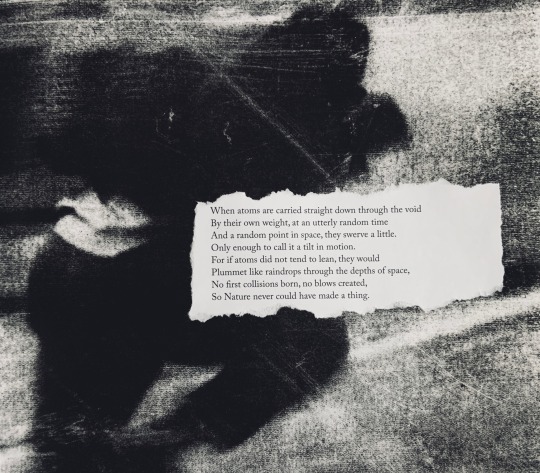
…For if atoms did not tend to lean, they would
Plummet like raindrops through the depths of space…
193 notes
·
View notes
Text
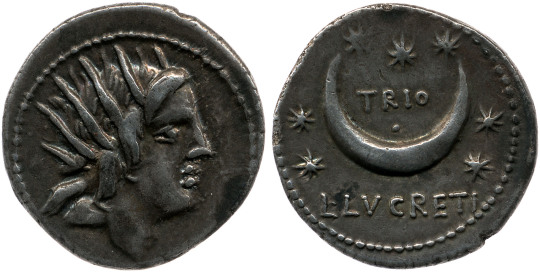
~ Denarius.
Moneyer: L. Lucretius Trio
Cultures/Period: Roman Republican
Date: 76 B.C.
Place of origin: Italy, Rome, Lazio
Medium: Silver
#ancient#ancient art#history#museum#archeology#roman#ancient history#archaeology#sol#denarius#coin#currency#stars#moon#lazio#silver#76 b.c.#lucretius
674 notes
·
View notes
Text
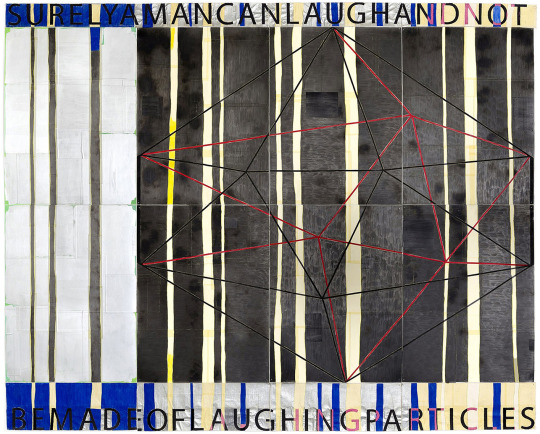
Dianna Frid, Be Made of Laughing Particles, (paper, paint, graphite, embroidery floss on canvas, and colored pencils), 2013 ["Surely a man can laugh and not be made of laughing particles", a line from Lucretius' De Rerum Natura (On the Nature of Things), from the translation by Rolfe Humphries] [© Dianna Frid]
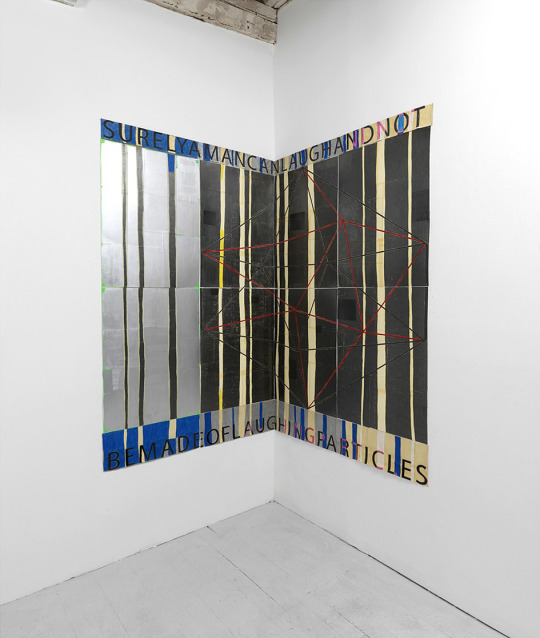

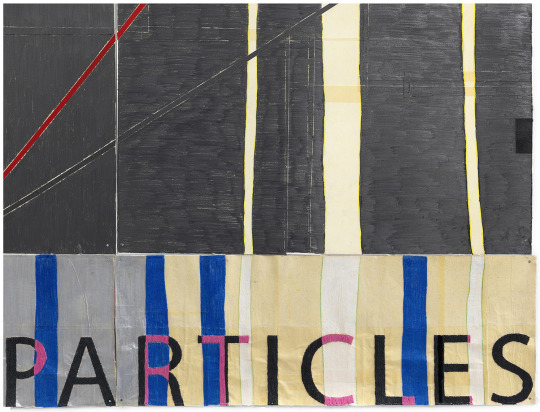

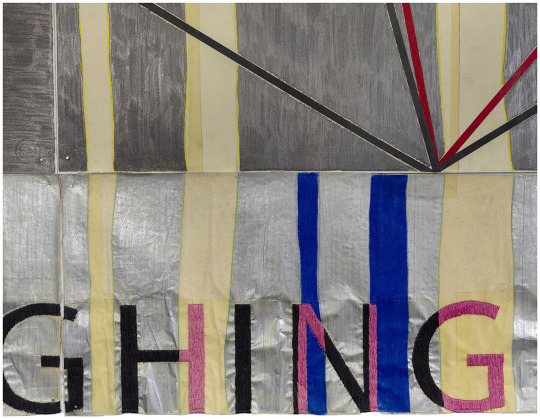
#art#mixed media#poetry#visual writing#lettering#geometry#dianna frid#rolfe humphries#lucrezio#tito lucrezio caro#titus lucretius carus#2010s
14 notes
·
View notes
Text
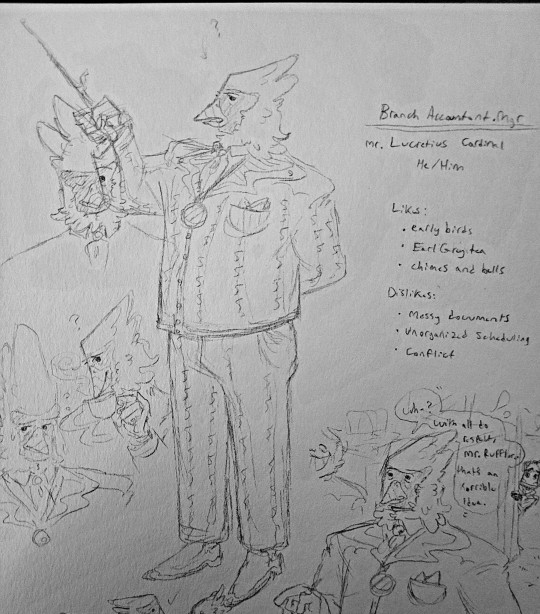
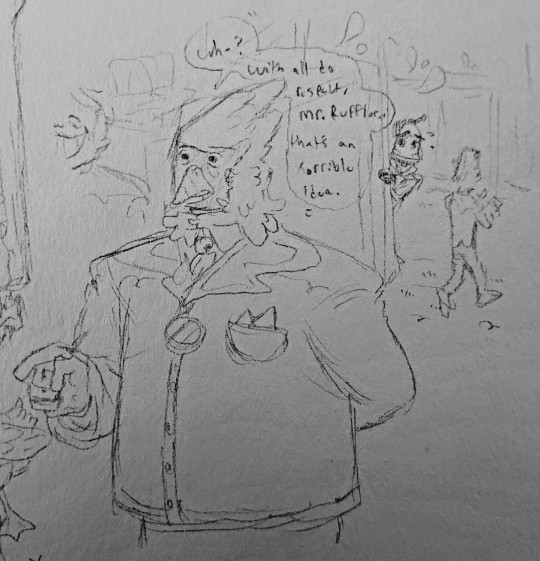
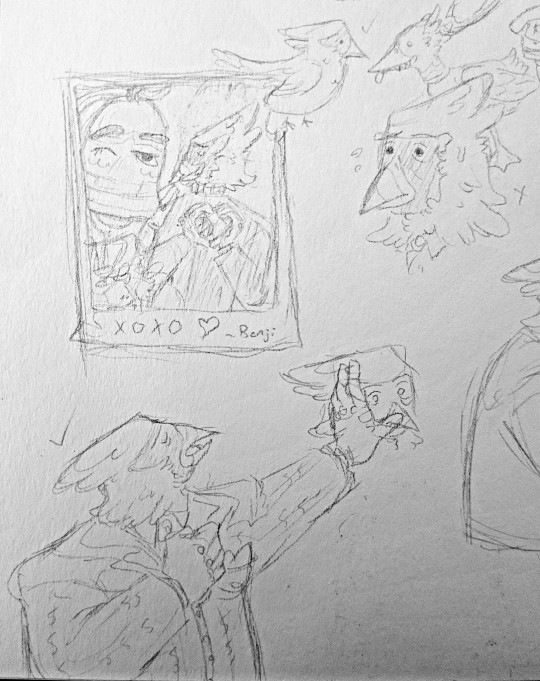
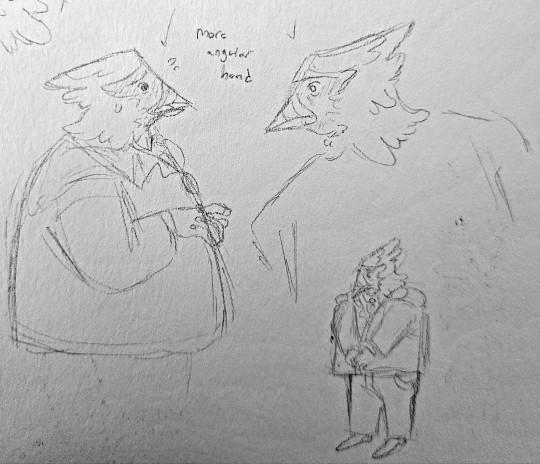
Some Branch Accountant concepts; (he and Benjamin used to date ages ago, back in their old conglomerate)
#he's the priest that was spoken of in one of my Benjamin arts#Lucretius would probably have mixed feelings seeing Benjamin again#he was outcasted by their old conglomerate's church because of their relationship and he hasn't been doing great since#it's been more than 15 years since they've seen each other#Lucretius would be nervous; what if Benjamin hates him? He hasn't been doing great himself what if Benjamin hasn't been either?#What if Benjamin is doing good? How would he look to him? etc#Lucretius tends to overthink things and is avoidant of conflict so he'd most likely shy away from speaking to Benjamin#Besides;; he doesn't work for COGS.INC; he's just visiting for a meeting discussing the possibility of being transferred over in the future#and about keeping track of finances between conglomerate branches when COGS.INC goes forth with expanding outside etc etc#Benjamin would be in disbelief seeing Lucretius... he hasn't talked to or seen him in forever.. poor bloke seems different#ttcc#toontown corporate clash#toontown: corporate clash#imagionary rambles#ttcc au#Lucretius Cardinal#Branch Accountant#ttcc oc
20 notes
·
View notes
Text
In his last days, suffering from a fatal tumor, Ludwig Wittgenstein made friends with Mrs Bevan, with whom he would go to a pub every night at 6pm. She would drink porto and a nearby ficus would have whatever drink Wittgenstein would order.
#philosophy#modern philosophy#19th century#19th century philosophy#dark academia#art#dark academic aesthetic#art history#dark acadamia aesthetic#philosophers#ludwig#ludwig wittgenstein#epicurean#lucretius#death#fun facts#fun philosophy facts
2 notes
·
View notes
Text
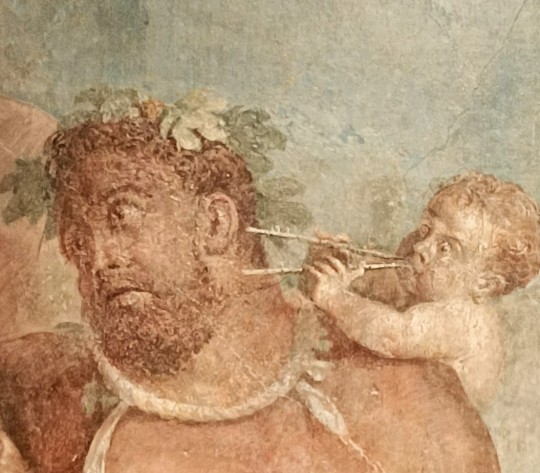

Arts, life, meme: Hercules and Omphale, from Pompeii, House of Marcus Lucretius, triclinium (16), east wall // The trumpet meme
#archaeology#pompeii#greek mythology#pompeii fresco#archaeology memes#classical studies#hercules#omphale
510 notes
·
View notes
Text
It’s time. I might be okay trying to drawing someone else from bg3 soon lol
So I’d like to know who would be an interesting first choice, among the options I wanna draw:
Bae’zel, Abdirak, Z’rell, Rugan, Haarlep, Aylin, Lucretius, Valeria
What d’yall think? Lae is my second fave companion (karlstarion is a single unit for me lmao), but there are some NPCs I’ve seen none or few art for that I really like (hello, Z’rell?). So I’m indecisive… might as well call for the people’s help haha
#bg3#baldur's gate 3#bg3 fanart#fanart#bg3 art#artists on tumblr#personal#question#halp#won’t stop the hellspawn art no worries#I’m drawing in wips forever for them#karlstarion has my whole heart
20 notes
·
View notes
Text
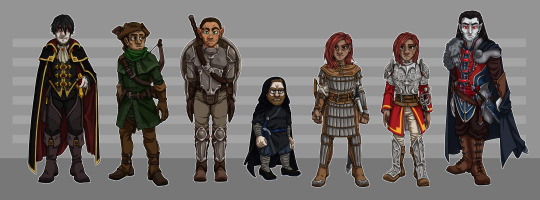
Repostober #4
From around this time last year. All the main characters from that time I DM'd Curse of Strahd. The first 4 are the players: Lucretius von Castonburg, Human* Blood Hunter; Reese Hawking, Human Ranger; Aroden Foxtarrow, Half-Elf Cleric; Gonbri Weregeld, Dwarf Monk. The next two are twins Mirabel and Korga Nimrovitch, their escort NPCs. (if you know CoS, they are reincarnated Ismark and Ireena. Swap the genders tho.) And of course the man himself, Strahd.
I explained more but it ended up kind of depressing lmao so its under the cut.
Around this time last year I got REALLY into trying to revive a DnD podcast my group... attempted. I was DMing Curse of Strahd. We always talked about that campaign really fondly and sort of promised to go back (and record again even if it was never processed and posted) and it would come up every now and then as the dropped campaign people most wanted to revisit but... it hasn't come up in a long time now.
But I was proud of the storytelling and my DMing and junk... also it had a fair bit of homebrew because at the time I was very near the end of a CoS campaign with a different group where I was a player. Where I was Tethys, in face. So I did this whole thing where it was like... 18 years after my group had defeated Strahd (though we hadn't gotten there in real life yet... also then... that campaign died too... SIGH) and a bunch of important NPCs (and a couple PCs) that died were reincarnated and... yadda yadda.
Really out of the blue I just kind of dove into re-editing it myself, and then they turned into videos because I know youtube and not anything about podcast sites, so then I did a bunch of art...
And the rest of my group just kinda didn't care. But I was mostly doing it for myself, at the time. But I don't exactly enjoy editing audio, so it petered out... I did complete and post 3 one-hour episodes. I think the 4th was pretty close too. idk. thinking about it makes me sad now. whoops.
#art#repostober#artists on tumblr#original character#OC#drawing#illustration#full colour#character design#TTRPG#TTRPG character#tabletop#Curse of Strahd#CoS#Strahd#fantasy#vampire#knight#monk#cleric#ranger#blood hunter#Lucretius#Reese#Aroden#Gonbri#Mirabel#Korga#character lineup
10 notes
·
View notes
Text
Human beings have long perceived the workings of destiny—the grand pattern of the mover of the universe—in coincidence, in accident, in the moment of perception of a problem previously unsuspected. So did Khlebnikov. Destiny was his prime concern. The category of those who study the workings of the universe is unclear—Lucretius and Dante may be scientists, just as Newton and Einstein may be poets. Khlebnikov was both. For him, the shift in sound that produces a shift in meaning was a shift in the structure of the universe. That the shift of a vowel made the Russian word for sword (mech) become the word for ball (miach) gave Khlebnikov a vertiginous sense of the power of language to influence the natural world. The shift of a consonant was all the distinguished inventors from investors or explorers from exploiters—and suddenly there appears the image of a struggle between N and S, between R and T. The movement of consonants became a metaphor for political and economic conflict.
To many of his readers this seemed, and seems, like nonsense. But we must be careful to distinguish, as he did, between nonsense and beyonsense (zaum, in Russian). The word zaum was part of the Futurist vocabulary, used by different poets in different ways. In Khlebnikov the word must be seen first as a function of its root, the word um: intellect, intelligence, reason, the rational faculty of the mind. Um implies the creation of “pilings,” the foundation of the man-made structures that must sooner or later destroy the mind’s unity with the natural world. Um also implies the separation of thinking man from the natural stuff of language: the shape, sound, and color of words. The opposite of um is magic, magic words, the part of language that contains a power inaccessible to the intellect and is always opposed to it. It is here that poetry stands—but poetry had been weakened during the nineteenth century, especially in Russia, by positivism and historicism. So Khlebnikov attempts a radical corrective: to reclaim a power for poetry by reaching back beyond (za) intellect (um), to the roots of language.
The “strange wisdom” of language perceived in this way, he writes below in the fragmentary essay “On Poetry,” “may be broken down into truths contained in separate sounds: sh, m, v, etc. We do not yet understand these sounds. We confess that honestly. But there is no doubt that these sound sequences constitute a series of universal truths passing before the predawn of our soul.” The purpose of beyonsense is to return to poetry a status as life-sustaining communication, relieved of worn-out words, those “clumps of intellect, stacks of sense, a wagon train of dead ideas.” Beyonsense was to make language ready for the future.
Charlotte Douglas, art historian, on Velimir Khlebnikov, from The King of Time, 1990, an English translation of the Russian Futurian's selected works.
#words words words#velimir khlebnikov#charlotte douglas#russian poetry#futurism#russian futurism#linguistics
14 notes
·
View notes
Text
𝐀𝐦𝐨𝐫, 𝐩𝐞𝐫𝐢𝐜𝐮𝐥𝐨𝐬𝐚 𝐩𝐚𝐬𝐬𝐢𝐨
1075 "[...] Nam certe purast sanis magis inde voluptas
quam miseris. Etenim potiundi tempore in ipso
fluctuant incertis erroribus ardor amantum
nec constat quid primum oculis manibusque fruantur.
Quod periere, premunt arte faciuntque dolorem
1080 corporis et dentis inlidunt saepe labellis
osculaque adfligunt, quia non est pura voluptas
et stimuli subsunt qui instigant laedere id ipsum
quodcumque est, rabies unde illaec germina surgunt.
Sed levior poenas frangit Venus inter amorem
1085 blandaque refrenat morsus admixta voluptas."
...
1075 "[...] Voluptuousness is more clear to the wise than to the foolish wretches.
In fact, right at the moment of full possession,
the ardor of lovers fluctuates in uncertain waves
who do not know what to first enjoy with their eyes and hands.
They press tight the creature they desire, inflict pain
1080 to her body, and often bite the tender lips to blood,
they nail her with kisses, for pleasure is not pure,
and there are dark impulses that push to tear the object,
whatever it is, from which the germs of that fury arise.
It hardly attenuates the torment Venus in the act of love,
1085 mitigates the bite, to which it is mixed, the joy of the senses."
Titus Lucretius Carus, vv. 1075-1085, De Rerum Natura IV liber.

#yandere#yandere core#tw: yandere#Latin#ancient rome#lucretius#yandere love#love#yandere anime#yandere x reader#litterature#roman literature
5 notes
·
View notes
Text
About Averyll:

1: Where in the Faerûn is your Tav from? Averyll grew up in the country between Candlekeep and Baulder’s Gate. His mum and dad have an inn off of the Coast Way
2: What is your character's alignment? Chaotic Good
3: Race and subclass? Half-Elf Bard
4: If your Tav was a companion, where would they be found? Maybe just wandering along the risen road somewhere between the abandoned inn and Wakeens Rest.
5: Dark Urge or no? Nope
6: What companion are you platonically close with? Karlach is his ride or die BFF but he’s friendly with all of the companions.
7: Romantically close with? Astarion and Halsin
8: Who are they suspicious of? The Dream Visitor
9: Is your Tav from Baldur's Gate? Why are they travelling there? He spent a lot of time there as he traveled up and down the Sword Coast practicing bardic arts.
10: Are they proficient in playing any instruments? Yes- viola
11: Weapon of choice? Rapier / Shortbow
12: What is their orientation? Like sexual orientation? Gay. Gay and slutty.
13: What are their thoughts on killing? Is it a necessary evil or do they enjoy it? He doesn’t enjoy killing mindlessly, but can’t help getting swept up in the bloodlust during a good battle.
14: What hobbies does your Tav have? He enjoys writing stories and drawing.
15: What NPC's do they like? Which one's do they dislike? NPC’s they like: Dammon, Alfira, Isobel and Dame Aylen, Madame Lucretius NPC’s they dislike: Cazador, Gortash, Lorroakan, Roland, Auntie Ethel
16: Do they have a favorite creature in the Faerûn? They’ve become quite fond of owlbears and cave bears lately.
17: Do they enjoy life as an adventurer? He does! Both his parents were adventures, so he came by it honestly. He hadn’t gone on too many adventures beyond the cities along the Sword Coast before the abduction.
18: What would your Tav be doing if they weren't kidnapped on the Nautiloid? Probably continue their travels up and down the swordcoast. Had they not been kidnapped they likely may have found up in some kind of adventure. It would find them eventually.
19: How do you think they'll meet their end? Dang. Hard to say! Probably shooting their mouth off to the wrong person at the wrong time, but that charisma is just too. Damn. high! So I’d like to imagine they’d die cuddled up with their loved ones safe and warm in bed.
20: Would they destroy the elder brain or control it? Destroy!
21: What is your Tav's favorite spell? Faerie Fire/Cure Wounds
22: What languages is your character fluent in? Common and Elvish
23: What do they do after the absolute crisis? Its a really hard choice for him because of how much he loves Karlach, but seeing Astarion run off smoking nearly broke his heart. He chased after him, sending Wyll in his stead. He and Astarion are currently adventuring through the underdark to find a cure for Astarion’s sun sensitivity.
24: Does your character believe in the afterlife? Not really.
25: What arcana major best represents your Tav? The Fool
26: What animal best represents your Tav? The swallow
27: What was their life like before the events of BG3? Pretty interesting. Averyll was still close with his parents, but had left the nest as it were. He was in the process of finding himself as he journeyed from country to city singing his stories.
28: Is your character the de facto leader of the party? Or do they consider someone else to be the leader? He’s the leader and he’s pretty bewildered as to -why-. He’s the youngest and the least experienced and everyone relies on his decisions. It's a little overwhelming but he’s doing his best.
29: Does your Tav want to utilize the tadpole powers or not? Hell yeah gimme them worms
30: What's your favorite thing about your Tav? He’s a good kid. He has his flaws, of course, but has a big heart. He wants to do right by the people he cares about and try to leave the world better than he found it. If he can make someone laugh or smile with his songs or quips it makes his day. I also love how he seems incredibly innocent and is VERY much not.
#baldur's gate 3#bg3#tav show and tell#averyll springheart#my blorbo let me show you him#my beautiful slutty son
3 notes
·
View notes
Text
Let Curiosity be your Guide!
“Remember to look up at the stars and not down at your feet. Try to make sense of what you see and wonder about what makes the universe exist. Be curious."
This is a wonderful quotation from that great and much-missed scientist and thinker Stephen Hawking. It encapsulates so much of what I have long felt should be education's guiding principle. Following on from my recent article, 'Another Kind of Narrow...', which argued that a job-market-trend guiding principle could only lead to an ephemeral educational form that only excluded and failed in its core purpose, I now bring you a more positive and passionate description of what it should be about in my humble opinion.
Curiosity drives learning, ideas, and ultimately an unlocking of our thinking potential that allows us to grow, engage, and discover. Hawking not only knew this, he represented this process. He would have, I think, been in excellent company with pre-Socratic philosopher Thales, who preferred to look up rather than down, driven by his curiosity and thirst for discovery.
Thales was mocked when he fell down a well, gazing upon the heavens. But he was not deterred. He remarkable believed that the stars were burning rocks, not gods. Given his limited tools, it is amazing that the power of his observation and logic led him to a suggestion which is not a million miles from reality. They certainly burn.
I was honoured back in October to partner my good friend Dr Nagamani Krishnamurthy, who is not only deeply passionate about education, but also an incredibly talented educator during World Education Empathy Week at EducationInfluence.com's conference with free lessons for whoever wished to tune in. We spoke about ancient philosophy and how it represented that beautiful curiosity that grows pleasure in learning from an early age and how t foster it in the classroom in a way that promoted continued passion for learning both in and beyond school.
Curiosity is natural and fabulous, from the child with the new toy to the great thinker, whose discovery makes our jaw drop and then smile, our day feeling warmed and enriched by their learning.
The moment when I realised teaching was right for me was when I was reading an unseen taken from Sophocles' Antigone, in my first ever teaching job. Sadly, I forget the passage now, but one of the girls smiled and with a look of delighted realisation, she told me that this play 'rocked', and the class plunged into a discussion of how little human nature had changed. Her curiosity was ignited and her sense of learning lit. She might not spout Classics at everyone in every day life (although if she's anything like me, she probably does), but her infectious learning and passion, I have no doubt will be inspirational.
I would like to end with a favourite curiosity-driven discovery. The atom. The roots of this wonderful theory are ancient. Logic and observation of weathered rocks and worn statues were evidence cited in support of the fifth-century BC hypothesis of minute particles to which everything could be reduced. Lucretius' curiosity led him to weave his strong scientific mind with his artistic genius into one of the finest poems ever written, de rerum natura. It represents of science and art's most beautiful harmonies.
Curiosity is for everyone and it is in everyone: the musician, the electrician, the academic, the pilot. What was the initial spark that made them go 'wow' and fired their passion and imagination. Let this guide education, let this help children grow, let this make them happy.
#stephen hawking#thales#lucretius#atomic theory#curiosity#passion#the wow factor#education#classics#learning#teaching#ancient wisdom#ancient world
13 notes
·
View notes
Note
Did Frederick know JJ? Did they get along at all?
Hsnsjsjdb They never met in person, but JJ did write him some short letters and Fritz knew JJ's works. Unsurprisingly, the Philosopher King did not like Jean-Jacques Rousseau's beliefs on life and politics lol. In 1762, JJ needed a country to live in, as he had been exiled from a couple already, and since Fritz advertised Prussia as an Enlightened haven for philosophers, JJ wrote a letter to Fritz (but maybe didn't send it):
"I have said a good deal that is bad about you, and perhaps I will again. However, I have been driven from France, from Geneva, and from the canton of Berne, and I come seeking asylum in your territories."
—July 1762, JJ Rousseau to Frederick
He then met Fritz' friend and confident Lord Marschall Keith and they hit it off. Keith was actually a fan of JJ's and acted as a liaison between JJ and Fritz. He even referred to JJ as his son and JJ called him his father. Fritz granted JJ and Thérèse asylum in Môtiers near Neuchâtel. As for his feelings towards JJ, he makes himself very clear in the letter to Keith where he agrees to help JJ:
"Your letter, my dear my lord, about Rousseau of Geneva gave me much pleasure. I see we think alike; we must relieve this poor wretch, who sins only by having odd opinions, but which he believes to be good. I will send you a hundred crowns, which you will have the kindness to give him for what he requires for his needs. I believe, by giving him things in kind, that he will accept them rather than money. If we didn't have the war, if we weren't ruined, I would have him build a hermitage with a garden, where he could live as he thinks our forefathers lived. I confess that my ideas are as different from his as is the finite from the infinite; he would never persuade me to graze the grass and crawl. It is true that all this Asian luxury, this refinement of good food, voluptuousness and softness, is not essential to our preservation, and that we could live with more simplicity and frugality than we do; but why renounce the pleasures of life, when one can enjoy them? The true philosophy, it seems to me, is that which, without prohibiting use, is content to condemn abuse; you have to know how to do without everything, but not give up anything. I confess to you that many modern philosophers displease me by the paradoxes they announce. They want to tell new truths, and they spout errors that offend common sense. I stick to Locke, my friend Lucretius, my good Emperor Marcus Aurelius; these people have told us everything we can know, apart from Epicurus' physics, and everything that can make us moderate, good and wise. After that, it is pleasant that we are told that we are all equal, and that consequently we must live like savages, without laws, without society and without police, that the fine arts have harmed morals, and other paradoxes so unsustainable. I believe that your Rousseau missed his vocation; he was doubtless born to become a famous cenobite, a Father of the desert, famous for his austerities and his macerations, a Stylite. He would have performed miracles, he would have become a saint, and he would have added to the enormous catalog of Martyrology; but at present he will only be regarded as a singular philosopher, who resurrects after two thousand years the sect of Diogenes. There's no need to graze grass, nor to fall out with all the philosophers of his contemporaries. Defunt Maupertuis told me of him a feature that characterizes him well. On his first trip to France, Rousseau lived in Paris on what he earned from copying music. The Duc d'Orléans learned that he was poor and unhappy, and gave him some music to transcribe in order to have an opportunity of doing him some liberality. He sent him fifty louis; Rousseau took five, and returned the rest, which he never wished to accept, although they pressed him, saying that his work was not worth more, and that the Duc d'Orléans could better employ this sum by giving it to people poorer and lazier than him. This great disinterestedness is unquestionably the essential foundation of virtue; thus I judge that your savage has morals as pure as the inconsistent spirit"
— 1 September 1762, Frederick to Lord Marschall Keith
He and Thérèse were mostly happy there, but the locals didn't like their presence and regarded them as strange foreigners with royal protection (Frederick was not particularly well liked in the region either). This is also where JJ started wearing his long robe and making lace, joking that he had become a woman, which was also not approved of by the locals. Even more than all that, he was living with an unmarried woman, Thérèse. JJ claimed that Thérèse was the daughter of a friend who had entrusted her to him upon his death, but no one bought the lie and rumors spread about them being lovers and even of Thérèse being pregnant (she wasn't, but they obviously were lovers). They also faced religious hostility, JJ was made to reaffirm his Calvinist faith in writing but Thérèse attended Catholic mass across the French boarder every week, the locals tried to pressure JJ to re-reaffirm his Calvinism and JJ refused. JJ of course published some controversial writing, which again pissed off the locals, specifically ones criticizing religion and he was accused of blasphemy. He refused Fritz' offer of largesse, asking him if there weren't more needy subjects under his rule who could make better use of it. He also implored him to end the war.
"You want to give me bread; are there not any of your subjects lacking it? Remove from before my eyes this sword which dazzles and wounds me; she has done her duty only too well, and the scepter is abandoned. [...] May I see Frederick the Just and the Dreaded covering his States with a numerous people of which he is the father, and J.-J. Rousseau, the enemy of kings, will go to die at the foot of his throne."
— 30 October 1762, JJ Rousseau to Frederick
At this point V made it public that JJ had abandoned his 5 children, and spread other rumors about him too, some true (like him abandoning his kids) some false (like him killing Thérèse's mother). Rocks were thrown through JJ's windows in the middle of the night and people even threatened to shoot him. Frederick sent off a reminder to the region, to respect his protection of Rousseau. But eventually, everything became too much, and JJ and Therese were compelled to leave in 1765. After they left, an effigy of JJ was found in the market, attached to it was a satirical document saying that he had disgraced Thérèse, and condemning the "Bavarian castrato" (Frederick) who brought him there. Frederick invited him to Potsdam, but JJ declined.
A year later, Frederick added in a letter to Voltaire:
"P.S. You ask me what I think of Rousseau of Geneva. I think he is unhappy and to be pitied. I don't like his paradoxes or his cynical tone. Those of Neufchâtel used it badly towards him: we must respect the unfortunate one; only perverse souls overwhelm them."
— December 1766, Frederick to Voltaire
#ask#anon ask#i was sitting on this ask for so long sorry jdjsjdjdnd#but i wanted to translate the quoted and never felt in the mood to#anyway right before all this; before JJ asked V if he could come to his territories; V invited JJ to Ferney and said hed treat him as a son#JJ did not respond to that invitation dbdbjsjdnd
33 notes
·
View notes
Note
What is classics? What belongs in this category? Do you have favorite classics?
“Classics” to me refers to the academic department dedicated to the study of classical antiquity. It includes ancient Greek and Roman cultures as a whole, including their languages, literatures, history, sciences, art, material culture, etc. as well as studying their broader Mediterranean context. I majored in both Greek and Latin, but was primarily a Hellenist. My area of focus was Homer and Greek intellectual history c.700-500 BCE, but I took classes up to Medieval and Renaissance Latin and classical reception stretching to the modern day. It’s difficult to pick a favorite author, my favorite classes in Greek were Plato, Thucydides, Herodotus, the Lyric Poets (Sappho etc.), Sophocles, Euripides, Plutarch, Demosthenes, and Homer of course, both the Iliad and the Odyssey, and then for Latin, Virgil, Livy, Catullus, Ovid, Horace, Lucretius, Tacitus. My favorite class generally was probably Greek and Roman Religion, Hesiod and the Homeric Hymns are deeply fascinating.
#i know it also means like ‘great books’ generally#and i’ve read a lot of those too#but for me classics means classical antiquity#classics
33 notes
·
View notes
Video
clinamen by celese boursier-mougenot
“clinamen 2013 MDF floor, PVC liner, water pump, heating device, porcelain bowls, water. Paula Cooper Gallery, New York, and Galerie Xippas, Paris. Céleste Boursier-Mougenot is a French artist and composer who creates large-scale acoustic installations and environments which draw upon laws of nature and the rhythms of everyday life to produce new forms of art and music. In clinamen white porcelain bowls float on the surface of an intensely blue pool. Circulating gently, swept along by submarine currents, floating crockery acts as a percussive instrument, creating a resonant, chiming acoustic soundscape marked by complexity, hidden patterns and chance compositions.” - ngv melbourne
‘clinamen’ derives from the term lucretius gave to the unpredictable movement of atoms in epicurean atomism.
“By contrast, in atomism, just such a model of heterogeneity, and of passage or becoming in the heterogeneous, is furnished by the famed declination of the atom. The clinamen, as the minimum angle, has meaning only between a straight line and a curve, the curve and its tangent, and constitutes the original curvature of the movement of the atom. The clinamen is the smallest angle by which an atom deviates from a straight path. It is a passage to the limit, an exhaustion, a paradoxical “exhaustive” model. The same applies to Archimedean geometry, in which the straight line, defined as “the shortest path between two points,” is just a way of defining the length of a curve in a predifferential calculus.” - deleuze and guattari’s nomadology, pg 18
this forms an interesting visual model of how content circulates online - ie. tumblr labs’ graphs of reblogs. it also makes me think of plasma, the fourth state of matter, which my handsome stem friend just taught me is when the atoms are moving so fast, the actual electrons in the atoms become detached from the nuclei and start to predominantly form into charged ions... the high level of ions in plasma make it a very strong electromagnetic force, as in lightning. plasma also creates a lot of radiation, which i should probably learn more about the process of because the wikipage is confusing. most of space, including stars, is made of plasma that is constantly changing its chemical composition due to the extreme heat.. so deleuzian
14 notes
·
View notes
Note
Hey, I noticed you are an Oxford classics student and I was wondering what is it like. I want to go to Oxford (no time soon) but I was originally going for History of Art. Until I saw classics and it had things I'm interested in like latin and greek. I really just want to know greek mythology. But Idk of that's enough for classics or if I should try history of Art. Mainly I'm asking what is it that you are learning in classics? I'm so glad I found your page. 😭😭
Hi, thanks for the ask. It’s a great question and something I wish I’d known because it’s definitely different from what’s advertised.
So I’m what’s called a Course II student. Course II is exactly the same as Course I except it means you haven’t got either Greek or Latin to A Level or equivalent so learn from scratch. You choose one language to study for 18 months, then you have the opportunity to learn a second (or drop the first entirely).
Language is a big part of the degree and makes up around 50% of first exams (Mods). For the first two terms, you have daily language classes (plus maybe some extra from your college). From third term (Trinity) onwards, you have one continuation class, one specialised reading class (for me that’s Homeric Greek) and a set-text reading class (eg Herodotus), as well as college language classes.
So, at the moment, for first exams (Mods), there are core modules and two modules of your choice.
CORE: The Iliad OR The Aeneid, depending on which language you’re studying. If you have both Latin and Greek already, you’ll study both.
CORE: Texts and Contexts. This focuses on links between history, archaeology and literature. Themes include Love and Luxury (Roman love poetry and linked archaeology), Class, The Persian Wars, and Dionysus.
PHILOSOPHY: you have to chose a philosophy option. Options include Modern Philosophy, Plato, Early Greek philosophy, and Lucretius.
SPECIAL SUBJECT: one extra subject of your choice - either archaeology or history. Choices include Greek sculpture, Greek vases, Roman architecture, Aristophanes (from a historical point of view) and some others I can’t remember.
Also expect a language paper based on each core option, as well as a separate core language paper.
You generally spend one term on each of these (8 weeks, though Texts and Contexts is about 2 terms), so you tend to have two essays per week on top of language work (expect homework from every class).
Once you get to Greats (final exams), there is a lot more variety and freedom in what you study. Greek Religion is an option.
Generally a knowledge of mythology is required in most of these subjects, but I wouldn’t say it’s specifically taught, at least not at Mods, though subjects like the Iliad will focus heavily on mythology, as does Classical archaeology. You are, of course, free to attend any lecture, and there are several centred around mythology available throughout the year. You can attend these no matter what degree you study.
It should be noted that there are currently plans for reforms of how the degree is taught, which I expect to come into play in about 3/4 years.
It’s also worth noting that, at least in my experience, Classics is a far more hectic degree with a lot more work than most degrees. Just something to keep in mind. :)
I hope that explains it a little and helps to inform your decision a bit. If you have any more questions or if I missed something, feel free to ask!
8 notes
·
View notes